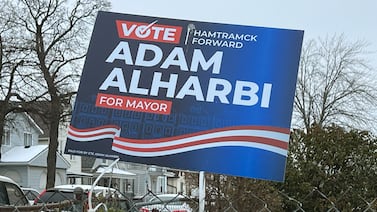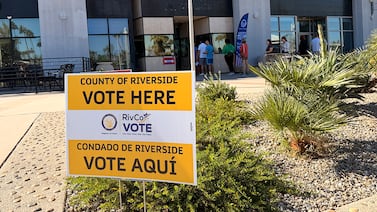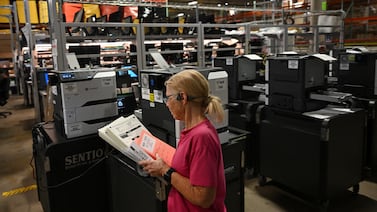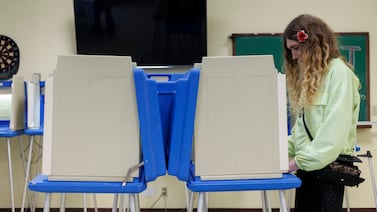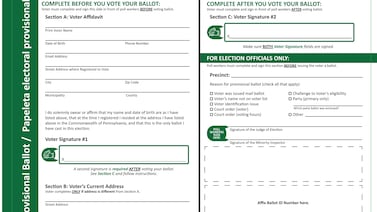Votebeat is a nonprofit news organization reporting on voting access and election administration across the U.S. Sign up for Votebeat Wisconsin’s free newsletter here.
In the early morning following Election Day in 2020, Claire Woodall, then Milwaukee’s elections chief, mistakenly left behind a USB stick carrying vote totals at the city’s central absentee ballot counting facility. Election conspiracy theorists quickly seized on the mistake, accusing Woodall of rigging the election.
Their claims were baseless, but the mistake increased scrutiny on the city’s election staff and led Woodall to create a checklist to make sure workers at central count didn’t overlook any critical steps in the future.
This year, despite the checklist, Milwaukee election staff at central count made another procedural mistake — and once again left the door open to conspiracy theorists.
Somebody — city officials haven’t said who — overlooked the second step outlined on the checklist and failed to lock and seal the hatch covers on the facility’s 13 tabulators before workers began tabulating ballots. For hours, while counting proceeded, the machines’ on-off switches and USB ports were left exposed.
After election officials discovered the lapse, city officials decided to count 31,000 absentee ballots all over again, a choice that led to delays in reporting results.
Results from the large and heavily Democratic city ultimately came in at 4 a.m. on Wednesday, only a few hours later than expected, but a time that conspiracy theorists implied was a suspicious hour for vote totals to change. Their posts echoed claims from 2020 that used sensationalized language like “late-night ballot dumps” to describe the reality that in big cities, absentee ballots take time — yes, sometimes late into the night — to collect, deliver, verify, and count accurately.
In fact, the results in Milwaukee couldn’t have arrived much sooner. Under state law, election officials can’t start processing the hundreds of thousands of absentee ballots until the morning of Election Day. This year, they got a late start, because of delays in getting workers settled, but were still expecting to be done around 2 or 3 a.m. Then it became clear the midday decision to redo the count would add more time to the process.
But those explanations have done little to curb the false conspiracy theories that have been proliferating on the right, including from losing U.S. Senate candidate Eric Hovde.
Election officials have for years known that the slightest mistakes, or even perceived errors, can trigger false claims. In this instance, the failure to follow a critical security step occurred in the state’s most scrutinized election facility, despite new procedures meant to reduce such errors.
For people with a conspiratorial mindset, such an oversight can’t be explained away as just a mistake, said Mert Bayar, a postdoctoral scholar at the University of Washington’s Center for an Informed Public. The errors can provide conspiracy theorists a feeling of validation because those errors make a “conspiracy theory more realistic … more believable.”
For those people, he said, election errors are instead perceived as “part of a plot to steal an election.”
Instead of considering the 2024 Milwaukee mistake a simple oversight, Bayar said, conspiracy theorists may think that the tabulator doors “cannot be left unlocked unless they’re trying something tricky, something stealth.”
Genya Coulter, senior director of stakeholder relations at the Open Source Election Technology Institute, said Milwaukee can still fine-tune its processes and checklists.
“I don’t think anybody needs to be demonized,” she said, “but I do think that there needs to be some retraining. That would be helpful.”
Milwaukee error initially drew complaints, but not suspicion
It was an election observer who first noticed the open tabulator doors and alerted election officials. Around 2 p.m., Milwaukee’s current election chief, Paulina Gutiérrez, went from tabulator to tabulator, monitored by Democratic and Republican representatives, to lock all of the doors. Two hours later, she made the call to rerun all ballots through the tabulators.
The tabulators had been in full view of partisan observers and the media, but behind a barrier that only election officials and some designated observers, like representatives for both political parties who accompany election officials during some election processes, can enter. Any tampering would have been evident, Gutiérrez said, and there was no sign of that.
For that reason, some Republicans at central count opposed recounting all the ballots and risking a delay. U.S. Sen. Ron Johnson, who went to central count on Election Day to learn more about the error, said he didn’t think anything nefarious happened, though he said the election operation there was “grossly incompetent.”
Coulter said the decision to start the counting over again was “the right call for transparency’s sake.”
Hovde, who lost his Senate race in a state that Donald Trump carried, invoked conspiratorial language to describe what happened.
“The results from election night were disappointing, particularly in light of the last minute absentee ballots that were dropped in Milwaukee at 4 a.m. flipping the outcome,” he said Monday in his concession speech. “There are many troubling issues around these absentee ballots.”
In an earlier video, Hovde criticized Milwaukee’s election operation and spread false claims about the proportion of votes that opponent, U.S. Sen. Tammy Baldwin, received from absentee ballots. That led to a skyrocketing number of posts baselessly alleging election fraud in Wisconsin.
One prominent conservative social media account questioned whether the tabulator doors being left open was a case of sabotage.
In a statement, the Milwaukee Election Commission said it “unequivocally refutes Eric Hovde’s baseless claims regarding the integrity of our election process.”
Why Milwaukee’s results were late
There’s no proof of fraud or malfeasance in Milwaukee or anywhere else in Wisconsin on Election Day. But a few key factors combined to delay Milwaukee’s results until 4 a.m.
First, Milwaukee central count workers started processing and tabulating ballots around 9 a.m., long after the 7 a.m. start time allowed under state law. The delay was a matter of getting dozens of central count workers organized and at the right station in the large facility.
The more high-profile one was the failure to close the tabulators, which prompted the decision to count 31,000 absentee ballots all over again.
But both of those slowdowns could have been less consequential had Wisconsin election officials been able to process absentee ballots on the Monday before Election Day, as some other states allow. Such a change could have allowed election officials to review absentee ballot envelopes, verify and check in absentee voters, but not count votes. An effort to allow election officials to do so stalled in the state Senate this year.
Checklist change could ‘improve transparency’
Milwaukee election officials may have avoided the situation entirely — and could avoid similar situations in the future — by modifying their central count checklist, said Coulter, from the Open Source Election Technology Institute.
Currently, the checklist states that at the start of Election Day, the tabulator doors should be locked and sealed. It’s not clear why that step was skipped. Gutiérrez didn’t respond to questions for comment about who was in charge of the process or whether that person faced disciplinary action.
But the step likely wouldn’t have been overlooked, Coulter said, if the checklist required the official in charge of locking the tabulators to be accompanied by a representative from each major political party.
“That’s a relatively painless change that … I think it would improve transparency,” Coulter said.
“There needs to be an emphasis on having two people from different political affiliations performing all duties that involve the tabulator,” she said.
Another pre-processing step on the checklist calls for people working at the tabulators to make sure the numbered seals pasted over the tabulator doors are intact. It doesn’t call for checking that the tabulator doors are locked.
To avoid a repeat situation, Coulter said, “They should also check to make sure that the door to the power button is properly locked, and what to do if it isn’t.”
Election officials recognize the scrutiny they face over errors, Coulter said, and they sometimes focus more on avoiding mistakes than running election operations.
“It’s like a racecar driver … If you focus on the wall, you’re going to wind up hitting that wall,” she said. “You have to train your mind to think about the curve and not the wall, but unfortunately, it’s really hard for election officials to do that, especially in high-pressure jurisdictions.”
Alexander Shur is a reporter for Votebeat based in Wisconsin. Contact Alexander at ashur@votebeat.org.

